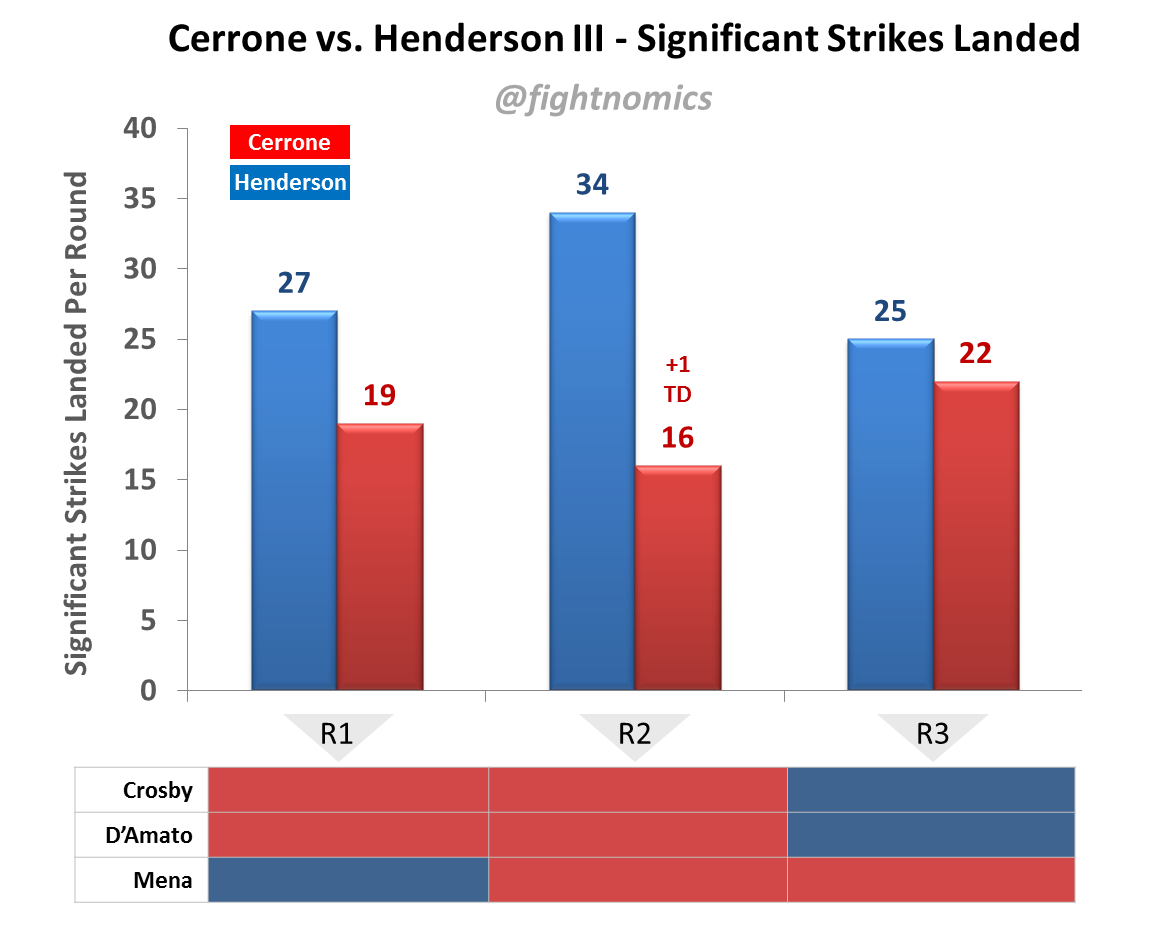It was the third meeting between Benson Henderson and Donald Cerrone this weekend, but the first in the UFC, and first without any title on the line. Yet the stakes were still high. Henderson was looking to rebound from his fist non-title loss, while Cerrone was looking to extent a frenzied win-steak that could put him into UFC title contention for the first time. Henderson went in as a slight favorite at the books, and at the end of the fight the body language of both fighters supported a third win for the Seattle native. But when the scores were read for the unanimous decision, Henderson was left stunned in defeat while Cerrone could only shrug uncomfortably in victory. So let’s take a look back at the numbers and see why Henderson thought he had earned the victory, and also check how judges scored things for each fighter.
Judging decision disagreement and other MMA metrics, get the book “Fightnomics” at Amazon.
The Action Visually, it was a close fight. All in all, the numbers viewed without that context are misleading, as the fight looks like a clear victory for Henderson. Henderson outworked, and outlanded Cerrone throughout. Henderson was the busier man throughout, but Cerrone was more often the one moving forward. Based on the numbers from the first round and the new on-screen FightMetric “Advancing” variable, it’s safe to say that the judges were valuing Cerrone’s forward movement more than the new “oblique kicks” that Henderson was using early and often. Henderson landed a record amount of leg kicks, yet didn’t appear to truly damage his opponent as leg kick barrages have done in the past. And ultimately, that was the difference in this fight. Cerrone moved forward, while Henderson believed his leg kicks would count for something. In a fight, sometimes the simple things count more. At the very least however, professional judges should be on the record for what counts more them. I’d guess that they’d have different priorities in scoring. The Scoring When 12 out of 14 MMA media outlets score the fight for one fighter, it’s safe to say there was a clear winner. But the three judges in Boston this weekend disagreed with the bulk of other observers, as they have done many times before. The most important question as always, is why? What led three judges to determine Cerrone the winner, when most people watching (including Dana White himself), scored the fight for Henderson? Clearly, various observers must be valuing different things at different levels. In this case, I think it boils down to two things: not all judges value leg kicks, and forward movement is still seen by many as superior to effective striking. In this fight both factors played to Cerrone’s favor, and for once Henderson was on the wrong side of a close decision. The final round was perhaps the closest on paper, but it was also, in my opinion, Henderson’s best round. A head kick mid-round wobbled Cerrone, and was the most threatening strike of the entire fight. The backwards movement of Henderson also came to an end, and he fought forward and with increasing aggression. Cerrone, meanwhile, was zero for five on takedown attempts, which generally should credit the other fighter for defending well. The result was that two judges (Crosby and D’Amato) did score the final round for Henderson. But it didn’t matter, those same two judges had already awarded Cerrone enough rounds to win the fight, so for them it was too late to change the outcome without a stoppage or miraculous 10-7 round. However, that still doesn’t explain the score from Mena favoring Cerrone despite these factors at play. This same judge awarded Henderson a very close round one, when Cerrone was much more aggressive in his forward attack, despite taking more damage. That round was given to Cerrone by two out three judges, yet Mena in the final round seemed to flip his impression of what is “winning.” Judges valuing different things is expected, the same judge valuing differing things at different times in a fight is less excusable. It’s also important to note that round two went unanimously to Cerrone, despite it being the most lopsided round in terms of strikes landed. And Henderson wasn’t just landing more, he threw 62 attempts to Cerrone’s 38, throwing more volume at the head, body, and legs than Cowboy, and also outworking him in the clinch. Yet all three judges agreed Cerrone won. So how valuable was that takedown towards the end of the round? I’d guess that without it, Henderson wins that round, and also the fight – as it’s the only clear differentiator favoring Cerrone in round two. Yet the takedown was fairly brief, and resulted in not one strike or submission attempt. It was definitely a case of a fighter “stealing a round” with a takedown, a well understood and frequent tactic. The surprise on Henderson’s face when the decision was read was telling enough, we didn’t need to hear him get choked up in the post-fight interview to know that he legitimately thought he won. But given the close decisions he’s been involved in before, many are simply shrugging this off again to bad judging, and concluding that Henderson was due to be on the wrong end of one. They may be right. But that doesn’t mean we shouldn’t revamp the judging review process to understand why judges are using different valuations when they score a round. Even with the numbers, I cannot convince myself that Henderson necessarily won, but I can convince myself that the judges were not consistent in their scoring. I bet Sean Spencer agrees with me. “Fightnomics” the book is now available on Amazon! Follow along on Twitter for the latest UFC stats and MMA analysis, or on Facebook if you prefer.
